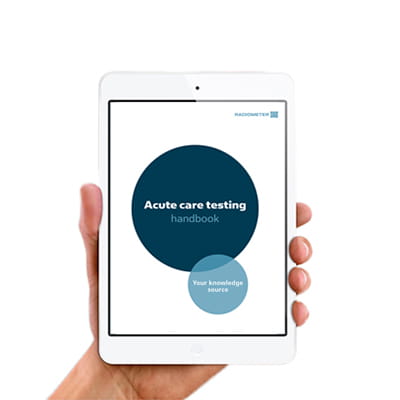Printed from acutecaretesting.org
October 2011
Arrhythmias in electrolyte disturbances
Summarized from El-Sharif N, Turitto G. Electrolyte disorders and arrhythmogenesis. Cardiology Journal 2011; 18: 233-45
In health plasma potassium concentration is maintained between 3.5 and 5.2 mmol/L. The most significant clinical effect of both raised plasma potassium (hyperkalemia) and reduced plasma potassium (hypokalemia) is on the myocardium (heart muscle).
This reflects the fact that the resting membrane potential of cardiac muscle cells is determined largely by the ratio of potassium concentration in intracellular fluid (ICF) to that in extracellular fluid (ECF). Slight changes in plasma (ECF) potassium concentration alters resting membrane potential of cardiac muscle cells, thereby predisposing to changes in the electrical activity of the heart that are clinically manifest as cardiac arrhythmias.
Some of these arrhythmias, e.g. ventricular fibrillation can result in cardiac arrest and sudden death. The clinical effect of abnormal plasma potassium concentration on the rhythm of the heartbeat is the principal focus of a recent review article.
The epidemiology and causes of both hyperkalemia and hyperkalemia are discussed, but it is the electrophysiological effect of both conditions that receives greater attention. The characteristic electrocardiographic (ECG) changes associated with abnormal plasma potassium concentration are also discussed in some detail. The review is not limited to the effects of abnormal plasma potassium.
Normal cardiac rhythm can also be disturbed by abnormality in two other commonly measured electrolytes: calcium and magnesium. The potential for ECG changes and cardiac arrhythmias among patients with abnormal plasma calcium or abnormal plasma magnesium concentration is also discussed.
May contain information that is not supported by performance and intended use claims of Radiometer's products. See also Legal info.
Acute care testing handbook
Get the acute care testing handbook
Your practical guide to critical parameters in acute care testing.
Download nowScientific webinars
Check out the list of webinars
Radiometer and acutecaretesting.org present free educational webinars on topics surrounding acute care testing presented by international experts.
Go to webinars







